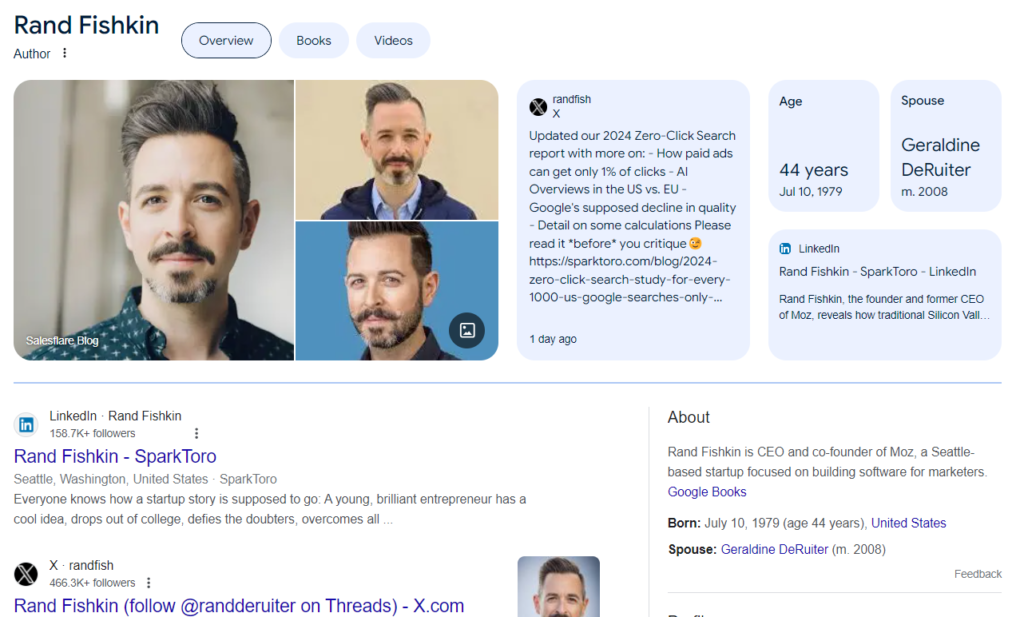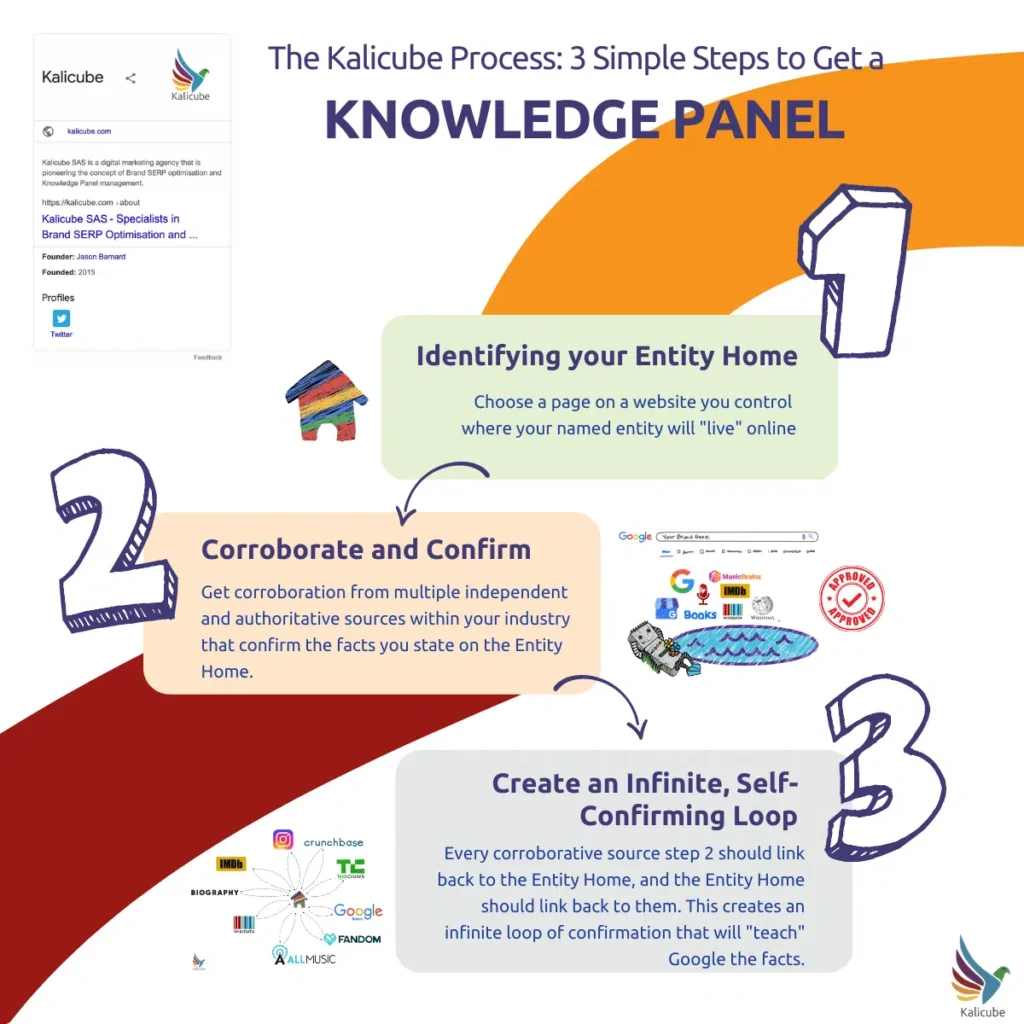Unlocking the Power of Google's Knowledge Panel with N-E-E-A-T-T.
In this blog, we’ll explore the Google Knowledge Panel, a process recommended by experts at Kalicube to achieve a Panel feature, and how it ties in with the concept of N-E-E-A-T-T.
Contents:
- What is a Google Knowledge Panel?
- A Three-Step Process to Get a Knowledge Panel Feature.
- Step1 Identify Your Entity Home
- Step 2. Corroborate and Confirm
- Step 3. Create an Infinite, Self-Confirming Loop
- Understanding N-E-E-A-T-T and its Role in the Knowledge Panel
- Why N-E-E-A-T-T is Crucial for The Knowledge Panel.
- Knowledge Panels Aren't Just for Celebs
- Practical Tips for Implementing N-E-E-A-T-T
- 1. Content Calendar
- 2. Authoritative Sources
- 3. Regularly Update
- 4. Collaborate Whenever Possible
- 5. Be An Author
- 6. Engage with Your Audience
- Conclusion
What is a Google Knowledge Panel?
In light of Google’s 2024 algorithm updates, establishing a credible, honest online presence is crucial for individuals and businesses alike, wanting to succeed in the world of SEO. One of the most powerful tools to exhibit your credibility is the Google Knowledge Panel. This concise summary of information about an entity, be it a person, company, or brand, is a testament to Google’s understanding and trust in the accuracy of the facts provided.
A Google Knowledge Panel is a feature in search results that provides a detailed snapshot of information about an entity, sourced from credible online sources. It includes photos, descriptions, key facts, and other relevant details. Essentially, it’s Google’s stamp of approval, indicating that the entity is notable and well-understood.
Knowledge Panels are part of Google’s Knowledge Graph, a system that Google uses to store and organize spiderwebs of information about entities (people, places, organizations, things).
The Knowledge Graph helps Google understand the relationships between different pieces of information and display them in a coherent, user-friendly way. When you search for an entity, the Knowledge Panel is the visual representation of the information stored in the Knowledge Graph. See below what happens when you search for someone, and they have a knowledge panel feature, like the example below of Rand Fishkin, CEO and co-founder of Moz.

A Three-Step Process to Get a Knowledge Panel Feature.
SEO experts over at Kalicube have developed a three-step process to secure a Knowledge Panel:
Step 1. Identify Your Entity Home
This is the main source for your entity’s information. It could be your official website’s about page, a social media profile, or a professional profile page on your employers website.
It’s best that you control as much of the Entity Home as possible, so you can make changes when required, so a website page that you actually own is the best option in that sense.
It’s advised that you use schema markup within this page too, to help Google understand the content format and information better.
Step 2. Corroborate and Confirm
Ensure multiple authoritative sources confirm the facts stated on your Entity Home. The more repetition about you throughout the Knowledge Graph, the more confidence Google has in the information.
Step 3. Create an Infinite, Self-Confirming Loop:
Link all corroborative sources back to the Entity Home, creating a loop that continually reinforces the accuracy of the facts. This could be links from Wiki pages, or links where you’ve contributed to content, or anywhere other pages that may confirm that you’re an expert of your niche.

Understanding N-E-E-A-T-T and its Role in The Knowledge Panel.
N-E-E-A-T-T stands for Notability, Experience, Expertise, Authoritativeness, Trustworthiness, and Transparency, as highlighted in our other blog, and was again, established by Kalicube. This concept emphasizes the importance of building and showcasing a strong, reliable online presence. Here’s how N-E-E-A-T-T ties into the process of achieving a Knowledge Panel:
Notability:
Ensure your entity is recognized and distinguished within its field. This can be achieved by gaining media coverage, awards, and other forms of recognition.Experience:
Highlight your extensive experience in your industry through detailed descriptions and case studies.Expertise:
Showcase your deep knowledge and skills by creating valuable content, such as blog posts, whitepapers, and videos.Authoritativeness:
Establish yourself as an authority by getting endorsements from other recognized experts and authoritative sources.Trustworthiness:
Build trust with your audience by maintaining consistency, honesty, and integrity in all your communications.Transparency:
Be open and transparent about your practices, policies, and the information you provide.Why N-E-E-A-T-T is Crucial for the Knowledge Panel.
Aiming for N-E-E-A-T-T ensures that you consistently produce high-quality, varied content that resonates with your audience and authoritative sources, and is acknowledged across various corners of the web. This not only helps in achieving a Knowledge Panel but also strengthens your overall digital presence in general. Here’s how:
- Increased Visibility: High-quality, varied content makes your entity more visible and attractive to Google.
- Enhanced Trust: Regular updates and authoritative content build trust with both Google and your audience.
- Solid Foundation: Even if you don’t achieve a Knowledge Panel immediately, focusing on N-E-E-A-T-T lays a solid foundation for future success.
Knowledge Panels Aren't Just for Celebrities!
It’s a common misconception that Knowledge Panels are reserved for celebrities and famous entities. In reality, any entity that provides accurate, corroborated information and builds trust with Google can achieve a Knowledge Panel. By focusing on N-E-E-A-T-T and following the Kalicube Process, you can significantly increase your chances of being featured.
Practical Tips for Implementing N-E-E-A-T-T.
1. Content Calendar:
Create a content calendar to plan and schedule content that highlights your notability, experience, expertise, authoritativeness, trustworthiness, and transparency.2. Authoritative Sources:
Ensure all information is corroborated by authoritative sources.3. Regularly Update:
Your Entity Home, and the information on corroborated sources should be up to date, and not conflicting – remember, repetition is key.4. Collaborate Whenever Possible:
In addition to keeping your corroborated sources up to date, you should be actively seeking more opportunities to increase the number of sources which can link back to your Entity Home.5. Be An Author:
Ensure that any time you create some content you’re listed as the official author using the dedicated Schema type.6. Engage with Your Audience:
Respond to comments on social media, participate in discussions, grow and nurture your bubble of corroborators within your field, and actively engage with your audience to build trust and credibility.Conclusion.
Achieving a Google Knowledge Panel is a testament to your entity’s online authority and credibility. By following the three-step process and focusing on N-E-E-A-T-T, you can enhance your chances of securing a Knowledge Panel. Remember, it’s not just about the Knowledge Panel itself—aiming for N-E-E-A-T-T is a significant step towards building a strong, trustworthy digital presence that will benefit your entity in the long run. So, start implementing these strategies today and pave the way for a brighter, more visible future within search engines.
